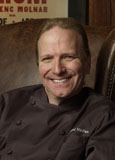Michel Nischan
 Gourmet Girl: In doing research about you, one of the things that stood out is your ĎCuisine of Well Being.í and I understand that started when you had a child diagnosed with diabetes.
Gourmet Girl: In doing research about you, one of the things that stood out is your ĎCuisine of Well Being.í and I understand that started when you had a child diagnosed with diabetes.
Michel Nischan: Actually another of my children was diagnosed with diabetes recently. I have 5 kids, but two have diabetes.
GG: It always seems that when you are touched by a subject personally, you are never quite the same.
MN: Thatís true.
GG: Tell me a little bit about the Cuisine of Well Being.
MN: Interestingly, both of my parents were farmers, so I grew up loving local, sustainable and organic. My grandparents, on my momís side, had a very large farm in Missouri. I always believed in the fact that the very best food is locally grown, in season and prepared with great care. But that was it. I was bathing in butter, floating on foie gras.
When I first started working in French restaurants, I began learning techniques like mounting fats into reduction and the French were only using butter. I felt that I was feeding people well because I always believed in vegetables, because of my momís background as a farmer.We always had organic gardens in our backyard growing up and I would work on the farm.
It wasnít until Chris was diagnosed that I learned a number of things. The first thing that I learned was when we went to the first meeting with the doctor. I brought a notepad and a pen, expecting to encounter a lot of things I didnít understand. The doctor spent most of her time explaining that the way we fed Chris would have more to do with his long term outcom than any other one thing. That and insulin management, which is a very simple thing.
I learned that you need so many calories with carbohydrates, you need so much insulin. Itís that simple. But the quality of the food, the quality of the carbohydrates have a lot to do with his long term outcome. That really caught me by surprise. When we got back from the hospital and I started going back to work, we recieved all these letters and articles and stacks of things from customers who felt badly for us because of what happened to Chris. They were diabetic, they had liver disorders, they had a blood disorders. They knew we were going to have to change the way we did things. They felt for us. It came out in empathy.
That's the 2nd thing I learned. So many of my customers were suffering from diet related or diet preventable conditions and I had no idea. Customers who would come in, order the same chicken dish day-in and day-out. They came in 3 times a week and would order the same thing. I thought they were just culinarily narrow minded, only to learn that was the only thing on my menu that they could eat.
GG: And yet they still wanted to dine at your restaurant.
MN: They still wanted to be with me and they loved the taste. The other thing I learned from that is people donít like to talk about their illness.
Healthy people, we go to a restaurant, we open a menu, we get all excited. We donít know what we want to have, everything looks delicious. Itís that Ďfuní thing. People with conditions, like diabetes, they open menus and itís depressing. "I canít have that, I canít have that, (pointing to imaginary menu entrees) I definitely canít have that." They might be able to have this, if they donít do this or they donít do that."
I started losing sleep over the whole thing actually. I took a look at all my items on the menu and got cold sweats. Because of my new awareness, I was at a crossroad and really not sure what to do. People had come to know and love Mish Mosh for what it was. I knew that I couldnít change it. If I changed it that dramatically it probably would be the end of that business. But I also I knew that I couldnít continue. So I decided to just end the business. It was like a perfect storm.
GG: So what did you do?
MN: Right at the time when all of this was going on, I went to the Beard awards in '95. I met Drew Nephorn, the very well known restauranteur in New York, who owns Tribecca Grill, Nobu, Montrachay. They had swept the Beard awards that year. Tracy de Jardin, the chef of Montrachy, got rising star chef of the year, Nobu got best new restaurant, etc, etc. We bumped into each other really by accident leaving. He said, "hey, I know you, youíre Mish Mosh." because we had been doing Gospel brunches on Sundays. We had the cover of the New York Times Friday Food section, I"m dating myself (laughter all around).
GG: That's okay, weíre right in there with you! (more laughter)
MN: We were on the cover and then when you opened to the inside there was a big story about Nobu. Drewís got this photographic memory. So he said, ĎWe gotta talkí. There had been just a recent article on how about my son had diabetes, and I talked about how I needed to make a change. Heís said "I need to make a change. Why donítí you come and work with me and weíll figure out a way to do a restaurant." He had this original vision and I knew that I wanted to move in that direction. The way Drew summed it up "With all the amazing producers that we have, and all the great local producers and farmers market movements that are starting to get strong, thereís got to be a way to do a really great menu that anbody with any health concerns can order from and have anything they want.í
GG: Still have the ability to do 'fine art on a plate,' as it were, but do it in that healthy way.
MN: Yes, that was my dream. To take away that depression of people opening the menu. I left Mish Mosh to our financial partner. I started working for Drew and we started working on the Heartbeat concept. Itís interesting because when we did Heartbeat, we decided we werenít going to do nutrient analysis. We werenítí going to do all the scientific stuff. We didnít want to be perceived as a 'health food' restaurant. We just wanted to do the menu and have people come in and eat and say "Wow that was really great. See you later."
GG: A 'by the way , this is healthy for you' thing.
MN: Exactly. We wanted it to be a Ďby the wayí thing. We didnít want to make a big deal out of it. But interestingly, the word got out and people did make a big about that.
GG: Tell us about Wholesome Wave, your oganizatuion with your partner Paul Newman.
MN: We founded it, Paul and I, when we opened our restaurant. We wanted to make sure that it was supporting the notion that food equals human, environmental and societal health. We felt that American food needed to be restored to the culturally significant level that it once was when we were once seen as the country of good neighbors. We ended up opening Wholesome Wave about 8 months ago, because of what we were doing with the restaurant. At first, we were opening, funding and managing farmers markets. We open in upscale areas and then leverage the participation of farmers and under served communities.
We had to form the non-profit because we were a commercial entity. And if we collaborated with other non-profits it jeopardized their 501(c)3, so we formed Wholesome Wave.
We have piloted a program that is just starting this year, where we are going to all of our farmers at our markets, at the end of the day Wholesome Wave is buying the produce from them at half price, then packing CSA style market boxes. Our chairman, Gus Schumacker, is the former under Secretary of Agriculture under Bill Clinton. He is our Chairman and long time personal friend of mine, and has actually has worked with USDA to amend their legislation, their regulations on food stamps. Food stamps can now be redeemed at farmers markets and farmstands. You donít have to have a retail food license. But a lot of people in under served communities wonít come to a farmerís market. Farmerís wonít go deep into under served communities because if they take a day off from the farm, they have to have food sales. What we do is we pack these boxes, go to the community health centers and the soup kitchens. All you need to have a farmstand is, permission from the landlord and liability insurance. You donít need a retail food license. You can setup that farmstand, and you can accept food stamps, and we have funding to double the value of foodstamps. So you cut the price of the food in half, then you double the value of the foodstamp. People are getting 4 for the price of one.
GG: Thatís how you are making organic accessible to the medium to lower income families.
MN: Weíre piloting in Connecticut, and at the same time, seeding it with like minded organizations in Massachusetts. Weíre going into Boston and Holyoke, San Diego, CA, Detroit, MI and Jackson, MS. Those are the next 5 pilots. We know the minute we put these pilots in , interest is going to explode.
GG: Hereís what I'd like to know. How can I get somebody in Florida to be a pilot? Right now the situation in Florida is very bad.
MN: I know that. Give us this year, because what weíve done is, Food and Wine has a new cause related marketing campaign called Grow For Good. And the concept is they want to raise money to support organizations that promote ĎFarm to Tableí and ĎPreserve Farmland" promoting access to healthy food to everybody. They chose us and they gave us funding. We believe that if we are successful with it this year, we will continue the program next year and then we will move into Florida.
GG: Gourmet Girl would love to be part of that.
MN: Yeah, no problem. Thatís awesome. Let us get our pilots up and running and we will stay in touch. I lived in Florida for 3 Ĺ years so I know whatís going on there.
In our continuing effort to bring national attention to our South Florida Gulf Coast, we will be going up to Connecticut to do a future Up Close and Personal with Michel and to discuss the Florida initiative of Whole Wave. We have spoken to Joshua Butler, Executive Chef for Governor Crist, as well as Justin Timineri, Culinary Ambassador and Florida's Executive Chef and they are excited about this program. We will keep you appraised of all the great developments regarding Whole Wave and it's initiatives.


